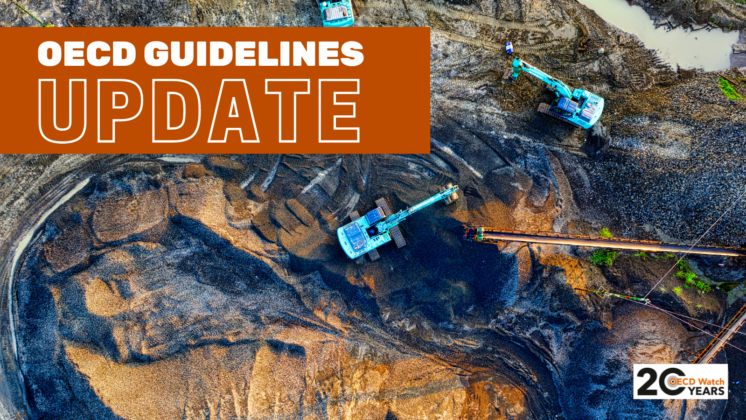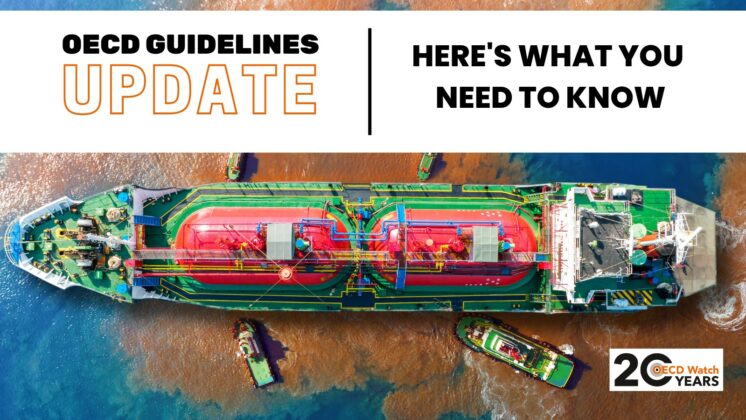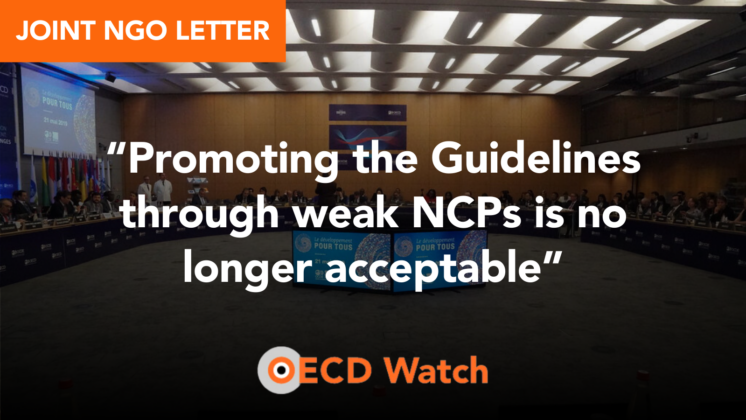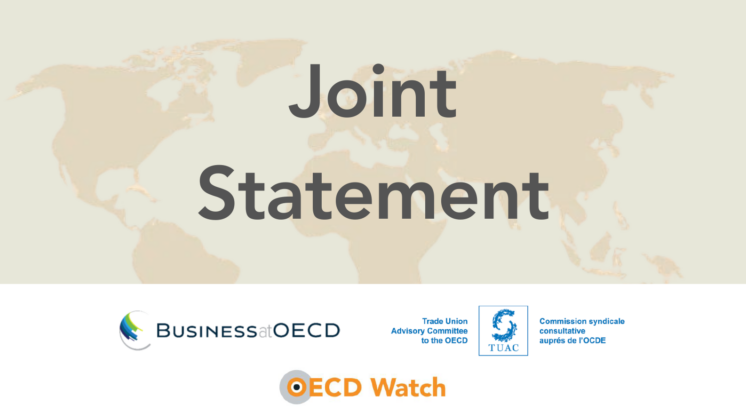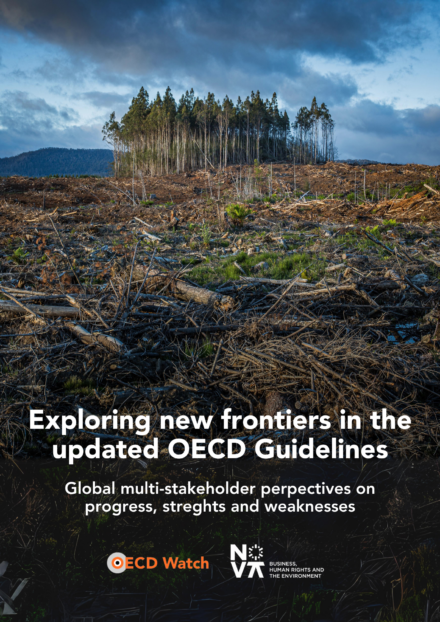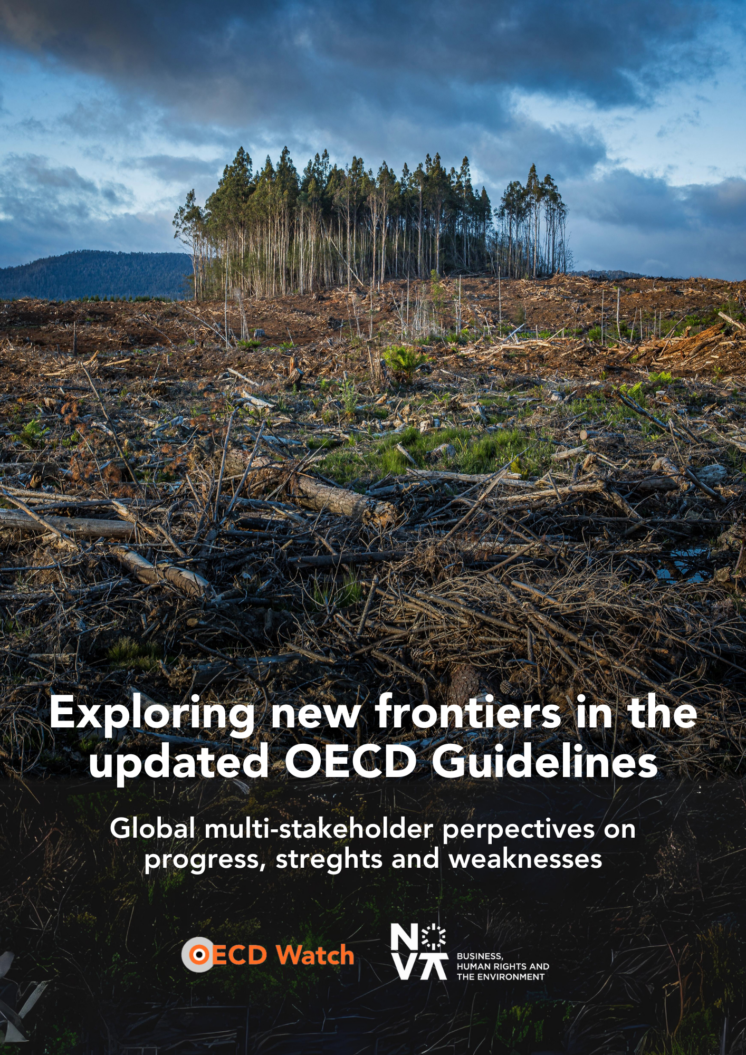On 8 June 2023, the OECD concluded a two-and-a-half year process to update the newly renamed ‘OECD Guidelines for Multinational Enterprises on Responsible Business Conduct’. OECD Watch had long advocated for an update and engaged extensively with the OECD throughout its formal negotiation process. In our capacity as the representative of civil society at the Investment Committee, OECD Watch provided extensive oral and written recommendations, in multilateral and bilateral settings, on what to update in the text.
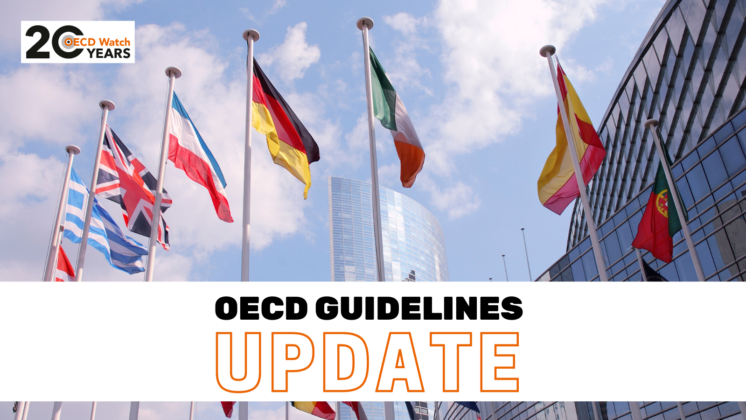
This article outlines OECD Watch’s activities in relation to the 2023 update of the Guidelines.
2019: OECD Watch engages in preliminary advocacy for updated Guidelines
OECD Watch has advocated for improvements to the Guidelines since at least 2016. Early advocacy focused particularly on strengthening the National Contact Points (NCPs), which are critical to achieving effectiveness of the RBC standards themselves.
In June 2019, OECD Watch held its biennial Global Gathering in Bangkok, Thailand. During the meeting, OECD Watch members and other civil society experts discussed the strengths and weaknesses of the Guidelines and NCPs and considered the potential value of updates to improve the text. Following the direction of members, OECD Watch committed to encouraging the OECD to update the Guidelines, and to engaging in an update process if one should occur.
2020: Civil society consultations generate OECD Watch baseline policy platform
From late 2019 through early 2020, OECD Watch consulted extensively with global civil society to identify the most outdated or inadequate topics and sections of the Guidelines text. Experts from over 250 civil society organisations participated in 17 consultations covering diverse substantive and procedural aspects of the Guidelines. OECD Watch used the expert input and its own experience advising NCP complaints to develop 13 broad topic-based policy briefs urging OECD governments to modernise both the responsible business conduct (RBC) standards for enterprises and the expectations for NCPs. Topics addressed ranged from human rights defenders, to workers rights, to climate and environment, to disclosure. These briefs formed the foundation for OECD Watch’s ongoing engagement with the OECD and individual governments. Initially shared with the OECD secretariat and governments in 2020, the briefs were made public in an updated form in 2022.
Throughout 2020, OECD Watch engaged in advocacy with the OECD Working Party on Responsible Business Conduct (WPRBC) and OECD governments encouraging them to modernise the Guidelines or risk them becoming obsolete and irrelevant in a fast-changing corporate accountability landscape.
2021: OECD Watch raises civil society voices during the OECD’s ‘stocktaking exercise’
OECD Watch’s 2020 advocacy paid off. In November 2020, the WPRBC agreed, as a preliminary step, to undertake a ‘stocktaking exercise’ in 2021 to examine the key developments, achievements, and challenges related to the Guidelines and NCPs and evaluate whether they still remained “fit for purpose” within the broader RBC ecosystem.
Throughout the OECD’s stocktaking process, OECD Watch made several written and oral submissions (such as in June 2021) highlighting civil society’s top areas of concern. OECD Watch’s report Get Fit: Closing gaps in the OECD Guidelines to make them fit for purpose used analysis from civil society complaints to justify the need to correct gaps and shortcomings in the standards for business and expectations for NCPs.
OECD Watch also urged the WPRBC to hold a public consultation to seek broad input on gaps in the 2011 text. Responding to OECD Watch’s call, the OECD held its first-ever public consultation from June to September 2021 seeking input on its draft stocktaking report assessing the strengths and weaknesses of the Guidelines. OECD Watch provided extensive support to enable civil society to participate, providing sample letters and issue briefs that helped ensure civil society was the top contributor to the public consultation.
2022: OECD Watch supports discussion of potential updates
Civil society’s submissions to the public consultation helped lead the OECD to publish in May 2022 a stocktaking report that comprehensively identified the leading areas of concern in the 2011 text. Every one of civil society’s overarching priority topics, and almost all of the sub-issues, were reflected in the report. The report highlighted, from the perspective of diverse stakeholders and delegates, that the standards for enterprises in the 2011 text were neither fully up-to-date nor complete, that the baseline expectations for NCPs were too vague, and that these challenges were making the Guidelines less useful as a tool for all users.
The report findings were instrumental in encouraging OECD governments to agree, in June 2022, to discuss potential targeted edits. At the June 2022 meeting of the OECD Council at the Ministerial Level, Ministers agreed to a “targeted update” of the 2011 Guidelines “to advance their implementation, promotion and to keep them fit for purpose.” OECD Ministers also reaffirmed their commitment to have “fully functioning” NCPs.
From April through July 2022, OECD Watch engaged in numerous consultations with the OECD secretariat and OECD governments to discuss potential specific changes in each chapter and section of the Guidelines.
2022-2023: OECD Watch advises WPRBC’s negotiation of draft updates
From September 2022 into May 2023, OECD Watch provided extensive written and oral recommendations to advise the OECD as it negotiated several drafts of potential updates to the Guidelines. To inform its advising, OECD Watch held further consultations with civil society in October 2022 to seek deeper expert input on issues ranging from the procedural expectations of NCPs to standards around technology-linked impacts. OECD Watch made regular submissions to the OECD (such as in November 2022).
During the negotiation period, OECD Watch again encouraged the WPRBC to hold a public consultation on draft text, and from January to February 2023, the WPRBC agreed to hold a second public consultation to solicit input on a consultation draft of proposed edits. Once again OECD Watch provided detailed guidance and encouragement to help civil society participate, and once again, according to the OECD’s summary of input received during the public consultation, civil society was the top contributor making almost 50% of the submissions. OECD Watch also made its own comprehensive submission on the consultation draft encouraging stronger expectations for NCPs and improved business standards on topics ranging from addressing the rights of marginalised groups to taxation.
When the OECD was preparing to hold its second-ever high-level RBC Ministerial Conference in February 2023, OECD Watch called for the WPRBC to invite keynote speakers from each stakeholder advisory group (civil society, union, and business), not only from governments. The WPRBC agreed, and the participation of a leading Indigenous woman activist invited by OECD Watch helped encourage the OECD both to engage in listening sessions (March 2023) with global Indigenous groups regarding necessary text edits on Indigenous Peoples’ rights, and to actually strengthen the standards. OECD Watch participated in the Ministerial with a small delegation of member organisations.
At the Ministerial meeting, Ministers of 50 OECD adhering countries adopted a Declaration on Promoting and Enabling RBC in the Global Economy, which acknowledges the contributions of OECD Watch to the promotion of the OECD’s RBC agenda. The Declaration highlights the need for “coherence, alignment, and harmonisation” of domestic RBC policies and the Guidelines, and underscored “the rights of members of marginalised groups and human rights and environmental defenders and the need to promote and protect civic space.” OECD Watch is calling for further guidance from the OECD on due diligence and engagement with marginalised or vulnerable groups, including Indigenous Peoples.
June 2023: OECD Watch welcomes update of the Guidelines
Negotiations on the new text inevitably involved trade-offs and compromises from both negotiating states and institutional stakeholders. The final text falls short of civil society’s demands and, in some places, expectations. Nevertheless, in OECD Watch’s view, the net result is positive. The majority of updates strengthen this authoritative global standard on RBC. In many areas, the revisions reinforce and therefore bolster other leading international norms on RBC, and on some topics the 2023 Guidelines advance normative standards.
OECD Watch appreciates the OECD Investment Committee’s and WPRBC’s extensive engagement with OECD Watch and the other institutional stakeholders throughout the process, and in particular its willingness to seek public input through two public consultations. We look forward to working with civil society, governments, NCPs, and the OECD to support implementation of the updated Guidelines.
Refer to OECD Watch’s statement for information on key updates and limitations in the new text, and standards areas needing further guidance: https://www.oecdwatch.org/updated-oecd-guidelines-give-civil-society-more-grounds-to-demand-corporate-accountability/.

